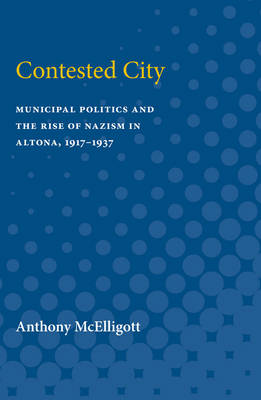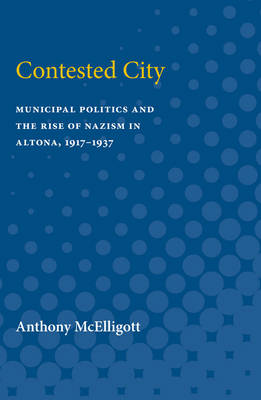
- Afhalen na 1 uur in een winkel met voorraad
- Gratis thuislevering in België vanaf € 30
- Ruim aanbod met 7 miljoen producten
- Afhalen na 1 uur in een winkel met voorraad
- Gratis thuislevering in België vanaf € 30
- Ruim aanbod met 7 miljoen producten
Contested City
Municipal Politics and the Rise of Nazism in Altona, 1917-1937
Anthony Patrick McElligott
€ 60,95
+ 121 punten
Omschrijving
In the wake of the First World War, many Germans saw the future of their nation as contingent on a vision of municipal progress. In this well-researched study, Anthony McElligott uses local politics as an analytical tool to decipher the bigger picture of the fate of the Weimar Republic.Focusing on the industrial city of Altona, McElligott locates his discussion of the contradictions of the Weimar "local state" along two axes--first, persistent financial, policy, and political conflict between the central and the local state; and, second, the conflicts within the Weimar local state between the displaced and resentful middle classes and the newly enfranchised working class.The Social Democrats used their considerable political influence at the local level to pursue progressive social policies. However, these local experiments in "practical socialism" alienated middle- and lower-middle-class voters without guaranteeing the support of all workers, since dwindling financial resources made it impossible to extend the benefits of the new social programs to many of the unskilled and poorer sections of the working class. Ultimately, the translation of the democratic republican vision into active policy provoked the conservative push for reassertion of central authority in the state.McElligott probes beneath the level of formal party conflicts to reconstruct the "politics of everyday life" at the street level. This study will be of wide interest to historians and political scientists.
Specificaties
Betrokkenen
- Auteur(s):
- Uitgeverij:
Inhoud
- Aantal bladzijden:
- 348
- Taal:
- Engels
- Reeks:
Eigenschappen
- Productcode (EAN):
- 9780472751723
- Verschijningsdatum:
- 1/01/1998
- Uitvoering:
- Paperback
- Formaat:
- Trade paperback (VS)
- Afmetingen:
- 152 mm x 226 mm
- Gewicht:
- 521 g

Alleen bij Standaard Boekhandel
+ 121 punten op je klantenkaart van Standaard Boekhandel
Beoordelingen
We publiceren alleen reviews die voldoen aan de voorwaarden voor reviews. Bekijk onze voorwaarden voor reviews.







